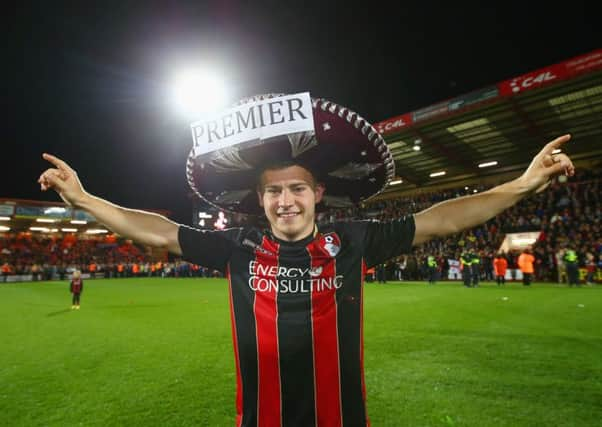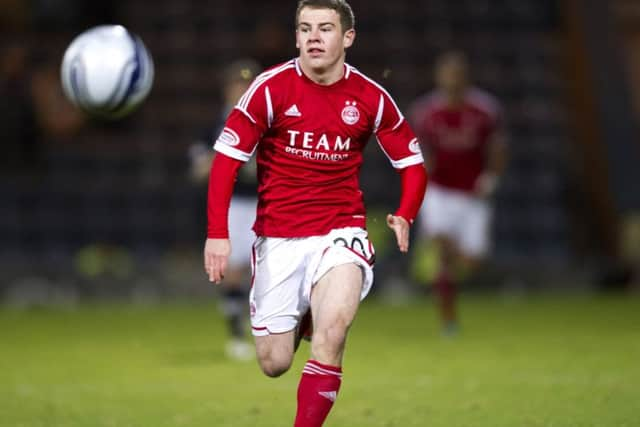Ryan Fraser vindicated for Bournemouth switch


How could this be? An up-and-coming winger on the point of establishing himself in the first team had been poached by a piddling little club on the south coast, known, if at all, for once beating mighty Manchester United in the FA Cup.
This thought wasn’t to be borne. It was particularly agonising because, perhaps, it represented a final unstitching of the comfort blanket Aberdeen fans have clung to for so long, one reassuring them that yes, their club is still a big club. Now, it had become apparent, they were unable to withstand advances from bloody Bournemouth. From Gothenburg to this? It was easy to feel their pain.
Advertisement
Hide AdAdvertisement
Hide AdBut Fraser himself later fleshed out why he had been persuaded to leave his hometown club. If he wanted to do extra training, he’d have to play head-tennis in a concourse below a Pittodrie stand, because the players’ minibus had to leave Aberdeen’s training pitches at an appointed hour. At Bournemouth, however, he could do as much extra training as he wanted, on verdant pitches stretching as far as the eye can see.


It was very easy to get the picture. Bournemouth were going places and Fraser wanted to hitch his wagon to the club where the young, inspiring and clearly talented manager Eddie Howe had returned for a second spell. And on Monday night, as Fraser danced around the pitch in a ridiculous hat following Bournemouth’s near-as-dammit promotion to the English Premier League, even the most ardent Aberdeen supporter must have grudgingly accepted that the winger had been vindicated.
“I just wished he had stayed a bit longer,” said an understandably wistful-sounding Craig Brown, who was manager at Aberdeen at the time. “But that is maybe me being a bit selfish, because I thought he was particularly promising.” Now a director at Pittodrie, Brown was an interested television viewer on Monday night, when Fraser came on for the final seven minutes of the 3-0 win over Bolton Wanderers for his 27th appearance of the season.
The victory means Bournemouth will finish in the top two unless Middlesbrough can win their final game against Brighton while at the same time ensuring a 19-goal swing. Fraser is relishing the chance to play Premier League football next season, something that was far from guaranteed in January 2013, when the then 18-year old joined a club in League One, the equivalent of the old English third division. This was another reason why the Aberdeen fans felt dismay.
It wasn’t as if Fraser was even heading to a Championship club, a well-travelled road for Scottish top-flight players. He was swapping the Premier League in Scotland for the third tier in England. He was joining a club who had finished in 11th place in this lowly dwelling the previous season and with a ground barely half the size of Pittodrie. “I was getting slated on Twitter and it was out of the blue because I signed for Bournemouth,” Fraser himself recalled yesterday. “Everyone was saying ‘who are Bournemouth?’”
But even then, secretive Russian investor and now owner Maxim Demin was plotting their ascent. While undeniably admirable, the so-called fairytale is robbed of some of the romanticism with knowledge of the spending hike accompanying it. The £400,000 Bournemouth paid Aberdeen for Fraser was loose change for a club able to count on such a wealthy backer. While not operating senselessly, given their financial support, they were not doing so profitably.
Bournemouth lost £15.3 million in the financial year ending July 2013 and have total debts of £15 million. But this will now be swept away, with Premier League earnings estimated at ranging between £100m and £120m in football’s land of opportunity. Brown still thought Fraser was leaving “too early”, although to be fair to the former Scotland manager, he said at the time he was confident the player would “flourish” in England. Of the six players he claimed he was forced to sell because of financial constraints, he rated Fraser as the most talented.
“I sold them all in about 18 months, because we had to please the banks,” he said. “We sold Sone Aluko, Richard Foster, Chris Maguire – and three young boys, young Ryan, Jack Grimmer and Fraser Fyvie. Ryan Fraser was the last one. We were going great guns at the time. When Ryan left and [Andrew] Considine broke his leg the wheels came off the barrow.
Advertisement
Hide AdAdvertisement
Hide Ad“He was determined, I’ll say that for him,” added Brown, who revealed that the player even asked for a face-to-face meeting with the owner. “Even Stewart Milne’s persuasive powers could not persuade him to stay.” Brown is a bit put-out at the part played by former Aberdeen striker Steve Lovell, who helped half-brother Howe scout talent in Scotland.
“I wasn’t comfortable that a former Aberdeen player was helping prise a player away from Aberdeen,” he said. There was another link with a one-time Aberdeen player. Legendary defender Alex McLeish’s son Jon worked for the agency firm which had Fraser on its books. But it was clear to anyone Aberdeen had a star on their hands. “He really dazzled,” said Brown, of a player who made just over 20 first-team appearances under him – Fraser actually made his debut for Mark McGhee, in 2010. “I really thought Ryan Fraser would have taken the SPL by storm.
“He reminded me at the time of Pat Nevin,” added Brown, with reference to a player he coached at Clyde. “Pat was arguably more skilful but the wee guy [Fraser] was more electric, he was sharper. Every defender he was up against booted him in the air. He was gaining free-kicks and penalties. I cannot compliment him highly enough.”
“I texted him to say congratulations after Monday. He was top of the class for attitude. He gives a lot of credit to the youth coaches at Aberdeen. He is not arrogant. He acknowledges the progress he made at Aberdeen.”
But the support system in place at Pittodrie was not enough to keep him there. And who can now blame Fraser for making what has since proved to be such an educated decision?
THE SCOTS WHO BLOSSOMED WITH CHERRIES
Ted MacDougall
Free-scoring Inverness-born striker who scored 103 goals in 146 games for Bournemouth between 1969 and 1972. His form won him a move to Manchester United but it was a turbulent time at Old Trafford and MacDougall lasted less than a season before moving on to first West Ham then Norwich. He was capped seven times by Scotland while at Carrow Road, scoring three times. He returned to Bournemouth later in his career and is still revered at the club where a stand is named after him.
Richard Hughes
Glasgow-born and Italian-raised midfielder who had spells with Atalanta and Arsenal before making the breakthrough with Bournemouth. He moved along the south coast to Portsmouth where he spent eight seasons, seven of them in the Premier League. Having won Scotland under-21 caps while with Bournemouth, Hughes went to win five full caps with Pompey.
Matt Ritchie
The first player to win a full Scotland cap while playing for Bournemouth. Made his senior international debut last month against Northern Ireland. He qualifies through his Scots-born father and revealed the trip north for the match was his first time in Scotland. A key player this season for the Cherries.
Paul Telfer
Advertisement
Hide AdAdvertisement
Hide AdEdinburgh-born right-back won one Scotland cap as a Coventry City player. Quit football after a successful spell with Celtic but came out of retirement to play for Bournemouth in 2007.
Peter Grant
After a long, successful career with Celtic, grant played in England for Norwich City and Reading before rounding off his career at Bournemouth where he was player/coach. Capped twice by Scotland during his Parkhead days.
Jimmy Gabriel
Began his career with Dundee, and was then a mainstay of the successful Everton side of the 1960s, helping them win both the championship and FA Cup. Was capped twice for Scotland while at Goodison. Moved on to Southampton then Bournemouth. After a spell in the North American Soccer League Gabriel returned to Dean Court as a coach for four years.
Warren Cummings
Aberdeen-born defender was a promising reserve player with Chelsea when he was picked by then manager Berti Vogts for Scotland’s tour of the Far East in 2002. He played for the national side in a 4-0 win against a Hong Kong XI and was awarded a cap even though the game was not recognised by Fifa as a full international. Struggled to break through at Chelsea and went on loan to several clubs, including Dundee United and Bournemouth where he went on to have a long career.